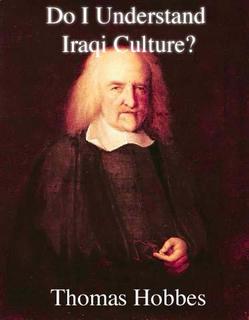Monday, October 24, 2005
Mohammad and Hobbes

Since 1787, all members of all branches of the US government have been locked in an epic battle over the language of our constitution and each person in each branch thinks he or she understands it best. They all, on some level, think they know what the framers intended, but I am sitting here studying it saying to myself “what the heck were they thinking?”
If they wanted to say “The government can’t kill you, tell you what to do or take stuff from you unless it’s legal in terms of future laws that the legislature will create,” they should have said just that. Instead, Thomas Jefferson, who was obsessed with this guy named John Locke who talked about something called the social contract by which governments receive their power from the people and therefore cannot “deprive its citizens of life liberty or property without due process of law,” decided to plagiarize Locke’s language. Granted: this is a very pretty phrase. It has its place in political philosophy and even in the US declaration of independence. It is a wonderful bit of rhetoric, but it is just that: rhetoric. It is flowery language that dances around the issue at hand. What we need in a constitution is hard, explicit language that clearly delineates governmental structure. A constitution should not be an experiment in political philosophy, it should be the concrete manifestations of these thoughts into basic governing laws for a country.
Ok, now that we have discussed what a constitution should be in general, lets discuss it on a more case-by-case basis. Thomas Hobbes said, “Where there is no common power, there is no law; where no law, no injustice.” This makes logical sense in our western world - if there were no overarching controlling body to inspire fear of punishment in those who would steal, murder, or commit other crimes, these kinds of people would likely run rampant. As such, a constitution and a central government are civilizing factors in western culture and following the thoughts of great thinkers like Locke serves to advance the causes of domestic peace. But Hobbes and Locke lived in western cultures. They studied western cultures and therefore, their conclusions really only speak to western cultures. In fact, I would submit that Hobbes assertion does not hold true for many Semitic cultures.
He says “where there is no common power…” ie where no official punitive body exists, “there is no law” ie anything is allowed. This is simply not true for many cultures. In Afghanistan, Iran, Iraq, Israel, Pakistan and many other such countries, a sense of tradition is just as powerful as the sense of law. In these cases, in the absence of a common power, tradition often takes over and serves to keep the peace. This is a fundamentally foreign concept to western culture so while western democracies have been trying to export democracy and constitutionalism to the middle east and other areas of the world, we have completely forgotten that they don’t always function the same way we do.
I will readily agree that democracy is a positive form of government, that people should hold some power of those who govern them, but we should not make the mistake of believing that all constitutions can be or function in the same way. With all the problems the US has had in plagiarizing from enlightenment thinkers for our constitution, why do we think these concepts will mesh any better with a culture and civilization which functions on a different level from those these enlightenment thinkers studied?
The Iraqi and Afghani constitutions have been bogged down by controversy and internal disagreement. Their helpful American supporters think that by nodding towards the religious tradition these countries want to play a part in their government that they can close the gap between an appropriate constitution for a western country and one for a Semitic country. I don’t think they could be any more wrong. In a culture that is ruled by tradition and custom - where shame can often regulate people as effectively as law - a constitution must serve an entirely different function. I am not sure our nation builders realize this. If we want to effectively spread democracy around the world, perhaps we must make a concerted effort to understand the culture that will be ruled by it.

